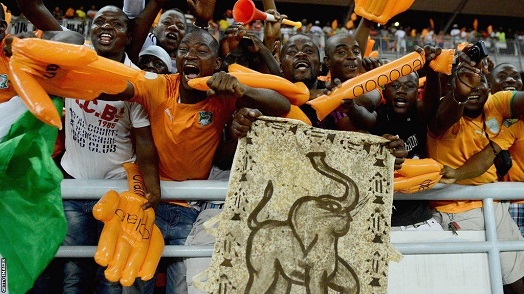Ivory Coast's hosting of the 2023 Africa Cup of Nations will further accelerate the country's impressive rebound since its civil war ended in 2011, the Ivorian government hopes.
By its own admission, the government has invested at least $1 billion on hosting the tournament, which kicks off on Saturday, having built four new stadiums while renovating two others.
In addition, airports, roads, hospitals and hotels have been either constructed or upgraded in the five cities that will stage matches; Abidjan, Bouake, Korhogo, San Pedro and the capital Yamoussoukro.
In the West African nation's biggest rebuilding exercise since the civil wars of 2002-2007 and 2010-11, some of the massive spend stems from a $3.5bn loan taken out, external with the International Monetary Fund (IMF) last April.
Yet with Ivory Coast ranked as the world's 138th richest nation out of 190 by the IMF, the outlay is a concern for some - even though Ivory Coast has experienced an average growth of 8% per annum since President Alassane Ouattara, a former IMF employee, took power in 2010.
"Ivory Coast is a poor country," Prao Yao Seraphin, an Ivorian economics professor, told BBC Sport Africa.
"As a result, President Ouattara has had to take out loans to finance this project, so we have to ensure the loans actually benefit Ivory Coast. The country will have to maintain the infrastructure.
"If we're not careful and don't think about creating events to boost revenues from our stadiums, I fear the country of the elephant will produce white elephants."
The term 'white elephants' - derived from an old Thai custom of giving such expensive-to-keep animals to the monarch - is regularly applied to costly infrastructure projects whose financial upkeep outweighs their usefulness.
So will Ivory Coast, once home to one of Africa's largest population of elephants and which takes its name from their tusks, suffer such a plight?
Not so - say the country's politicians.
Building for the future
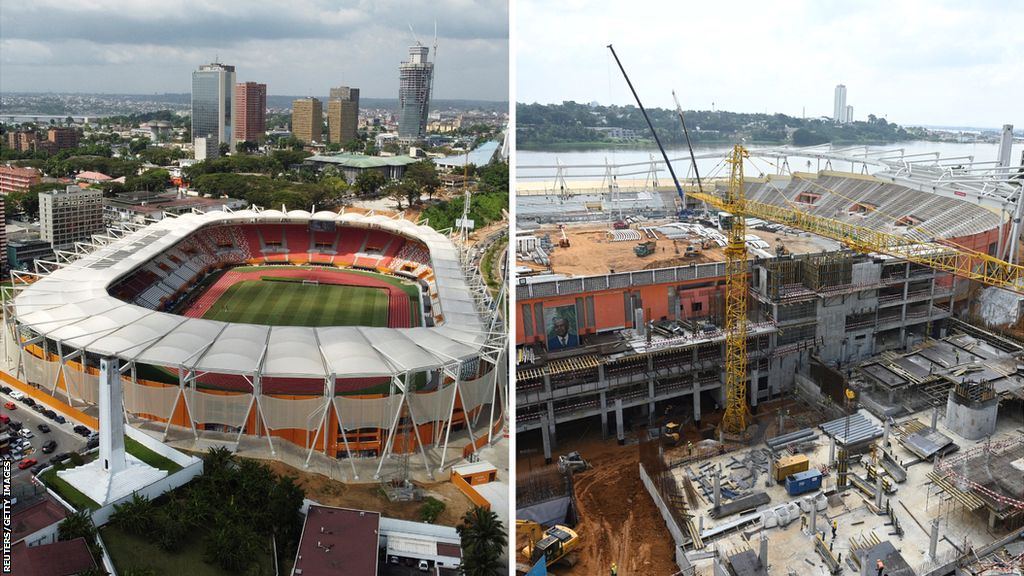
The Felix Houphouet-Boigny Stadium, which hosted the opening and final matches the 1984 Nations Cup, has been renovated for the 2023 finals
After shelling out more than $1bn - with some media reports doubling this total - most investors might hope for a financial return but Francois Amichia, who runs the 2023 Nations Cup organising committee, says this was never the intention.
"When Ivory Coast decided to organise this Nations Cup, it was not to make money but to reposition itself," Amichia, a current Ivorian MP and a former sports minister, said in December.
"It was an opportunity to provide sports infrastructure - and I must remind you that no sports infrastructure had been built for years - with the Nations Cup allowing us to have four new and two refurbished stadiums in one go."
Some $79m,, external $84m, external and $113m, external has been spent respectively on building new stadiums in Yamoussoukro, Korhogo and Abidjan, namely the Alassane Ouattara Olympic Stadium, while the refurbishment of Abidjan's Felix Houphouet-Boigny venue cost another $109m., external
Originally constructed in 1964, the latter staged Nations Cup matches when Ivory Coast last hosted in 1984, with Bouake's stadium, built for those finals, the other stadium used.
While 24 training centres have either been built or refurbished in the five host cities, three 'Afcon cities' of 32 five-room villas have been constructed in Bouake, San Pedro and Yamoussoukro with a new 48-room hotel opening in Korhogo.
Hospitals in Korhogo and San Pedro have been respectively upgraded and built, with the two cities' airports - and Bouake's - also refurbished, while highways from Abidjan - both west to coastal San Pedro, and north to Korhogo - have been modified (among other road improvements elsewhere).
"Organising the competition has allowed us to improve transport links," added Amichia.
"We know that Ivory Coast went through a difficult period, which was not easy economically. But this Nations Cup has allowed Ivory Coast to equip itself with sporting and non-sporting infrastructure worthy of a developing country."
Making use of facilities
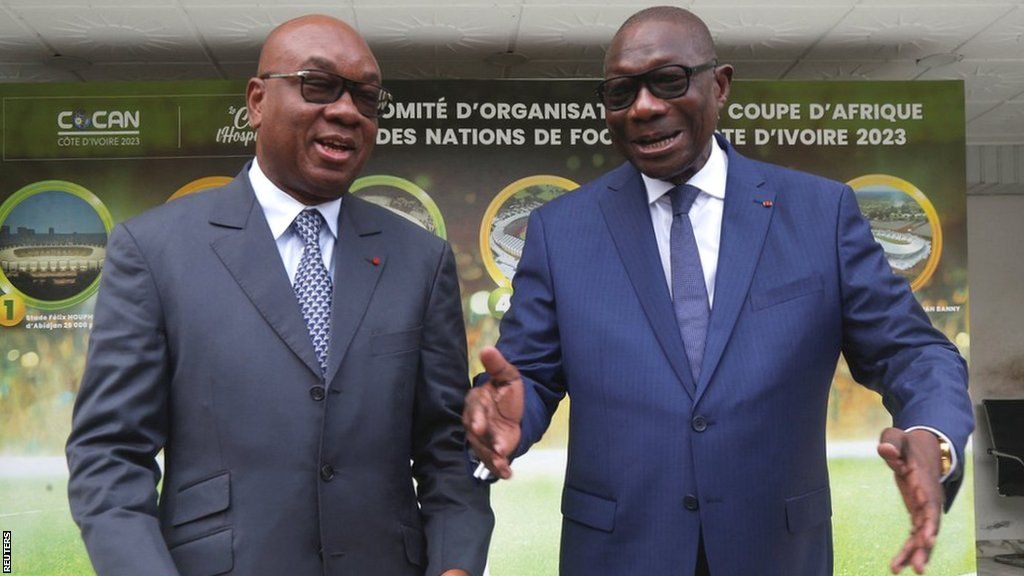
Ivorian football federation president Idriss Diallo (left) and local organising committee chairman Francois Amichia (right) have been heavily involved in preparing Ivory Coast for the 2023 Africa Cup of Nations
Meanwhile, the Ivorian football federation (FIF) has been planning how to address the concerns held by the likes of Professor Seraphin over the costly new stadiums' future.
Having already hosted the Women's African Champions League in November (in Bouake and San Pedro), the Ivorians want to become a regional hosting centre - particularly for those countries whose national stadiums are unable to host internationals on safety grounds.
Used 27 times for 'home' games by such countries in both 2023 Nations Cup and 2026 World Cup qualifying, Morocco has been a popular destination - but Ivory Coast now wants some of the action too.
"We're going to ensure our country becomes the hub of West Africa in terms of football and sports competitions," said FIF president Idriss Diallo, pointing out athletics tracks at some stadiums.
"This will offer a space to all countries which do not have infrastructure approved by the Confederation of African Football and Fifa."
Though yet to be formally approved, a presentation that stadiums be opened to the public has been made by some within the government, arguing that a healthier population will reduce the burden on a state which introduced universal health coverage in 2019., external
President Ouattara is keen to ensure regions not staging Nations Cup games also have decent sporting infrastructure, while a joint project with France is creating 10 mini-sporting complexes across Ivory Coast.
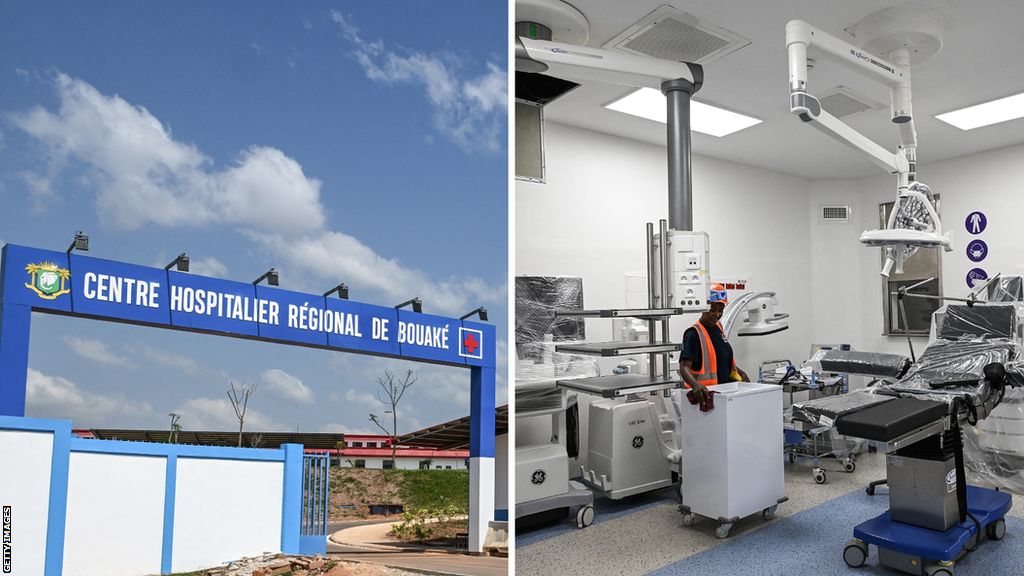
A new hospital has been built in Bouake, central Ivory Coast, ahead of the Africa Cup of Nations
A 'great opportunity' for business
Since the end of the civil wars, which displaced more than a million people, Ivory Coast has surged financially.
Thanks to significant government investment and the strong performance of its two main experts - coffee and cocoa (with Ivory Coast the world's largest exporter) - the country's economy looks set to become West Africa's second biggest.
In 2013, the GDPs of Ivory Coast and Ghana were $43bn and $63bn respectively whereas the IMF's 2022 figures show the gap had closed, with the countries proclaiming GDPs of $70bn and $73bn (with both still significantly behind oil-rich Nigeria's $477bn.)
In the economic capital Abidjan, restaurateur Akouba Angola embodies recent Ivorian growth.
Having been overseas during the civil wars, Angola - who undertook an MBA in the United States while away - returned in 2017.
"I thought it was the right time to come back because the country was at peace and everything was going well," she told BBC Sport Africa. "Ten years ago, opening a business would have been a risk."
Though confident of success, she nonetheless professes surprise at how well things have gone - having opened five restaurants since 2021 - and is now hoping the Nations Cup can further fuel the Ivorian economy.
"The Nations Cup is a very great opportunity for business, because many people coming from overseas will discover what we're doing in Ivory Coast," she rallies. "For example, I want to open many franchises across Africa."
Abidjan accounts for roughly 80% of the country's economic product and, with the Nations Cup being hosted around the country, the hope is that San Pedro in the south, Yamoussoukro and Bouake in the centre and Korhogo in the north will start to close the gap.
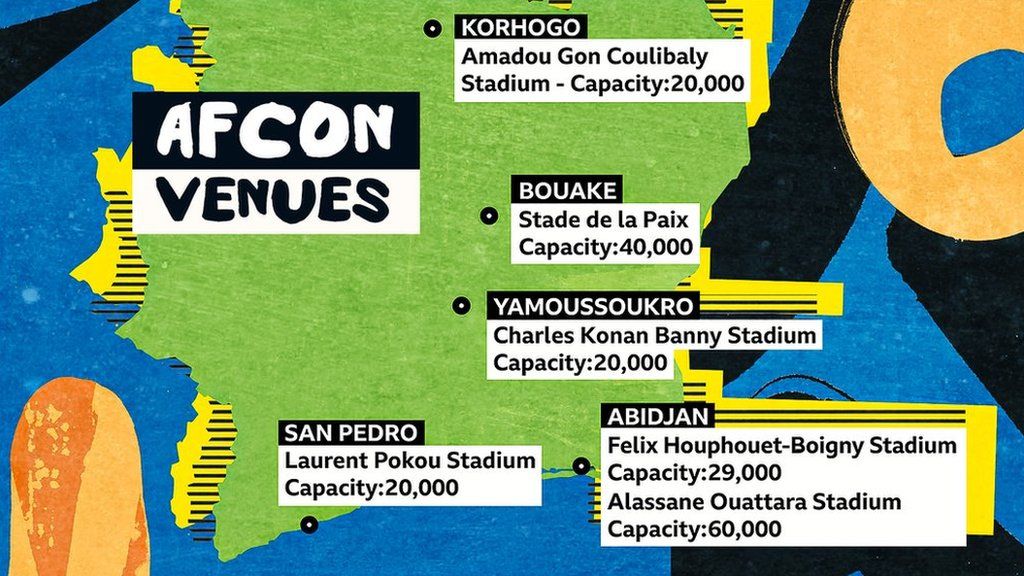
Six stadiums will be used for the 2023 Africa Cup of Nations in five host cities across Ivory Coast
"Korhogo, San Pedro, Bouake and Yamoussoukro will be in the spotlight and this can boost business," said Professor Seraphin of Bouake's Alassane Ouattara University, who believes the Nations Cup benefits will range from short- to long-term.
"The first short-term advantage is it will boost the attractiveness of Ivory Coast to private investors, since the cameras will be on us," he explained.
"There'll also be a lot of business for traders, jobs will be created in hotels as we welcome all the visitors and tourism - which represents around 9% of our GDP - will be boosted."
Longer term, Seraphin believes the improved stadiums will give Ivorians a "new enthusiasm" to attend games, especially with new facilities such as restaurants and merchandising.
"So Korhogo, Bouake, Yamoussoukro and San Pedro will benefit from these stadiums as well as the improved hospitals and health facilities - and the country will benefit from these massive renovations to boost long-term growth," he said.
With the 2016 terror attack when militants killed 16 people at the beach resort of Grand Bassam, about 40km (25 miles) from Abidjan, still fresh, Seraphin believes failproof security as well as reduced congestion and matches without any complication will be key to any success.
"If we meet all these conditions, Ivory Coast will emerge as a great country and one that can capitalise on this competition for the better."
BBC

